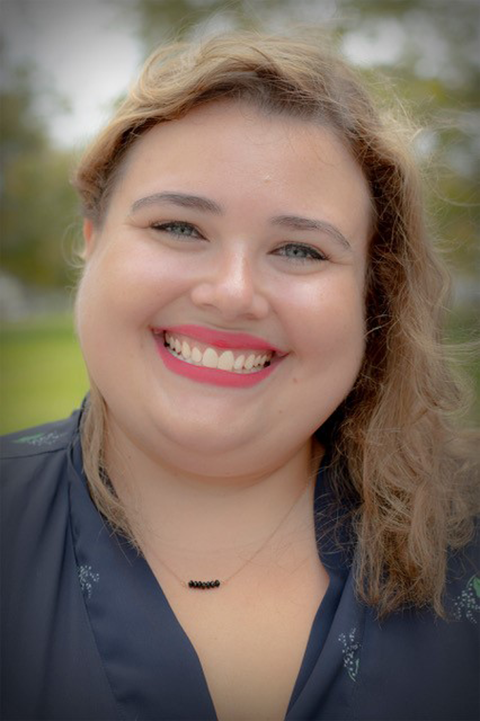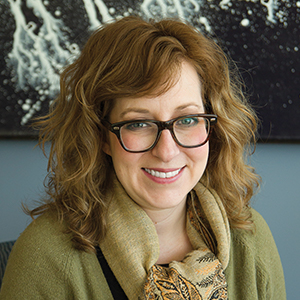Meet Danielle Schmitt
Danielle L. Schmitt, a postdoctoral researcher at the University of California, San Diego, will be one of two official tweeters for the American Society for Biochemistry and Molecular Biology's annual meeting, which will be held virtually in conjunction with Experimental Biology later this month. ASBMB Today talked to her about her background, experience with science communication and expectations for the meeting. The interview has been edited for style.
Tell me a bit about your background and educational journey.
I’m originally from Dayton, Ohio, and I’m the oldest of three girls. My dad is a materials scientist and always encouraged my interest in science. I wasn’t sure what I wanted to do with my life, so I went to college thinking I might change my major from chemistry to something else.

I went to Ball State University in Muncie, Indiana, for my undergrad degree. I really enjoyed my chemistry and biochemistry classes, where I learned the “how” behind biological processes. I got to do summer research at the Air Force Research Laboratory in my hometown. I was really inspired by my summers at AFRL, and I decided I wanted to continue in scientific research.
I went to the University of Maryland, Baltimore County, for my Ph.D., at the suggestion of my research mentor at AFRL. At UMBC, I worked with Songon An, using fluorescence microscopy to study metabolons, or phase-separated complexes formed by metabolic enzymes.
I really like using microscopy tools to interrogate cellular events, which is why I joined Jin Zhang’s lab at UC San Diego in La Jolla, California, for my postdoc.
Tell me a bit about your research.
In the Zhang lab, we use fluorescent protein-based genetically encoded kinase and small-molecule reporters to study cellular events. These molecular spies can be used to investigate signaling in real time in single cells. I work on AMP-activated protein kinase, or AMPK, a key regulator of cellular metabolism. I use reporters for AMPK activity to uncover mechanisms for spatial activity of AMPK in and around organelles. I’m especially interested in AMPK activity around the lysosome and mitochondria, and in the nucleus.
You manage the lab’s Twitter account. How did that come to be, and what have you learned from that experience about the science Twitter community?
The pharmacology department at UC San Diego is pretty social media savvy. Several of the faculty are active on Twitter and encourage everyone in the department to have a social media profile. We finally joined Twitter shortly after I started in the lab. I think I was asked to run the lab Twitter account because I would often talk about science-related things I read about on Twitter. Also, I’m a typical millennial, so I’m pretty engaged on social media. I’ve been on Twitter since 2008!
Since running @jinzhanglab, I’ve done a lot of research to figure out how the lab Twitter could be used for science outreach and how to get the most engagement from tweets, like what time of day is best to post and to always include a link or image. In the beginning, I worked with lab members to promote the account and would celebrate milestones in the follower count at group meetings. Now the account has over 2,500 followers, and we get more followers organically, like when we tweet about a new paper.
I’ve found that Twitter is an amazing way to get our research out in the world and promote the careers and achievements of people in the lab. When lab members give talks or posters at conferences, I promote these on Twitter, and we’ve found it increases the number of people who check out our posters or talks. Twitter is also a good way to get advice or suggestions from the community. We’ve asked Science Twitter for help and answered other people’s questions. I also learn a lot from reading the tweets of people we follow, and I’ve read some really cool papers. Even if you’re not active on Twitter or don’t want to be, if you follow a lot of people in your field, Twitter becomes almost a science newsfeed where you can keep up to date on new research. I’ve also made friends because we found each other on Science Twitter!
What kind of career do you want to have once you wrap up your postdoc? Are you aiming for an academic career, or are you ready to switch gears?
I’m currently aiming for an academic career. During my Ph.D., I didn’t want to go into academia, I was pretty set on switching gears. Once I started my postdoc, I really enjoyed the ability to direct projects and explore what I think is interesting, which is a key reason I want to stay in academia. I also really enjoy mentoring students and working with them to develop their scientific and professional skills. I know being a professor is really hard, but I think I’m up for the challenge.
What else are you passionate about? What do you do in your spare time?
I really like volunteering and being involved in my community. In grad school, I volunteered at an animal shelter, where I got to walk the adoptable dogs and help people find their new best friend. It was really awesome to see how excited people would get when I brought out their new dog or cat to take home. I adopted my own two cats during grad school, and I enjoy spending time with them. I’m a bit of a cat lady. I’ve been able to volunteer in my postdoc, most recently at a COVID-19 vaccine clinic in San Diego. It’s very rewarding to talk to people who are so excited to get vaccinated.
Outside of lab, I like to take advantage of everything San Diego has to offer. I enjoy going to the beach and the various parks in San Diego and Southern California. Joshua Tree National Park is amazing and my favorite. Before COVID, I went to a lot of great local wineries, breweries and cafés, which I am hoping to be able to do again this summer.
Anything else you’d like to share?
I’m very excited for EB/ASBMB 2021. The first time I went to EB/ASBMB was in 2016, and it’s been one of my favorite meetings! I’m excited to share the amazing science being presented at EB/ASBMB with everyone on Twitter.
Enjoy reading ASBMB Today?
Become a member to receive the print edition four times a year and the digital edition monthly.
Learn moreGet the latest from ASBMB Today
Enter your email address, and we’ll send you a weekly email with recent articles, interviews and more.
Latest in People
People highlights or most popular articles

2026 ASBMB election results
Meet the new Council members and Nominating Committee member.

Simcox wins SACNAS mentorship award
She was recognized for her sustained excellence in mentorship and was honored at SACNAS’ 2025 National Conference.

From humble beginnings to unlocking lysosomal secrets
Monther Abu–Remaileh will receive the ASBMB’s 2026 Walter A. Shaw Young Investigator Award in Lipid Research at the ASBMB Annual Meeting, March 7-10 in Washington, D.C.

Chemistry meets biology to thwart parasites
Margaret Phillips will receive the Alice and C. C. Wang Award in Molecular Parasitology at the ASBMB Annual Meeting, March 7-10 in Washington, D.C.

ASBMB announces 2026 JBC/Tabor awardees
The seven awardees are first authors of outstanding papers published in 2025 in the Journal of Biological Chemistry.

Decoding how bacteria flip host’s molecular switches
Kim Orth will receive the Earl and Thressa Stadtman Distinguished Scientists Award at the ASBMB Annual Meeting, March 7–10, just outside of Washington, D.C.

